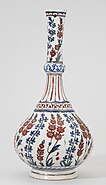Wikipedia:Today's featured article
|
Today's featured article Each day, a summary (roughly 975 characters long) of one of Wikipedia's featured articles (FAs) appears at the top of the Main Page as Today's Featured Article (TFA). The Main Page is viewed about 4.7 million times daily. TFAs are scheduled by the TFA coordinators: Wehwalt, Dank and Gog the Mild. WP:TFAA displays the current month, with easy navigation to other months. If you notice an error in an upcoming TFA summary, please feel free to fix it yourself; if the mistake is in today's or tomorrow's summary, please leave a message at WP:ERRORS so an administrator can fix it. Articles can be nominated for TFA at the TFA requests page, and articles with a date connection within the next year can be suggested at the TFA pending page. Feel free to bring questions and comments to the TFA talk page, and you can ping all the TFA coordinators by adding " |
Featured article candidates (FAC) Today's featured article (TFA):
Featured article tools: |
From today's featured article
Thekla (820s or 830s – after 870) was a princess of the Amorian dynasty of the Byzantine Empire. The eldest of seven children of the emperor Theophilos and empress Theodora, she was proclaimed augusta (an imperial title) in the late 830s. After her father's death in 842, her mother became regent for her younger brother Michael III, and Thekla was associated with the regime as a co-empress alongside Theodora and Michael. Thekla was deposed by Michael, possibly alongside her mother, in 856 and consigned to a convent in Constantinople. In one narrative, accepted by some Byzantinists and rejected by others, she became the mistress of Michael's friend and co-emperor Basil I, but was neglected after Basil murdered Michael in 867 and took power as the sole emperor. In this narrative, she took another lover, was discovered, and fell out of favor, then was beaten and had her property confiscated. (Full article...)
From tomorrow's featured article

Empire of the Sultans was a touring exhibition from 1995 to 2004 displaying objects from the Khalili Collection of Islamic Art. Around two hundred exhibits, including calligraphy, textiles, pottery (example pictured), weapons, and metalwork, illustrated the art and daily life of six centuries of the Ottoman Empire. Many of the objects had been created for the leaders of the empire, the sultans. Two of the calligraphic pieces were the work of sultans themselves. In the 1990s, the exhibition was hosted by institutions in Switzerland, the United Kingdom, and Israel, and its first catalogue was published by J. M. Rogers. The exhibits visited thirteen cities in the United States from 2000 to 2004, despite controversies in the wake of the September 11 attacks and the Iraq War. Critics described the exhibition as wide-ranging and informative. They praised it for showing beautiful art works – naming the calligraphy in particular – and for presenting a fresh view of Islam. (Full article...)
From the day after tomorrow's featured article
Ty Cobb was suspended for ten days during the 1912 baseball season. Cobb was disciplined for beating Claude Lucker, a fan who had been heckling him during the four-game series between Cobb's Detroit Tigers and the New York Yankees. Cobb was ejected from the game on May 15, 1912, and American League president Ban Johnson suspended him indefinitely. Cobb's teammates took his side, and after defeating the Philadelphia Athletics on May 17, told Johnson that they would not play again until Cobb was reinstated. Johnson refused to do so. Seeking to avoid a $5,000 fine, owner Frank Navin told manager Hughie Jennings to recruit a team; he did so. Facing the Athletics, baseball's World Champions, the replacement players, joined by Jennings and his coaches, lost 24–2, after which Cobb persuaded his teammates to return. They and Cobb were fined, but Navin paid. The walkout was baseball's first major league strike; it had little effect, but teams put additional security into stadiums. (Full article...)



